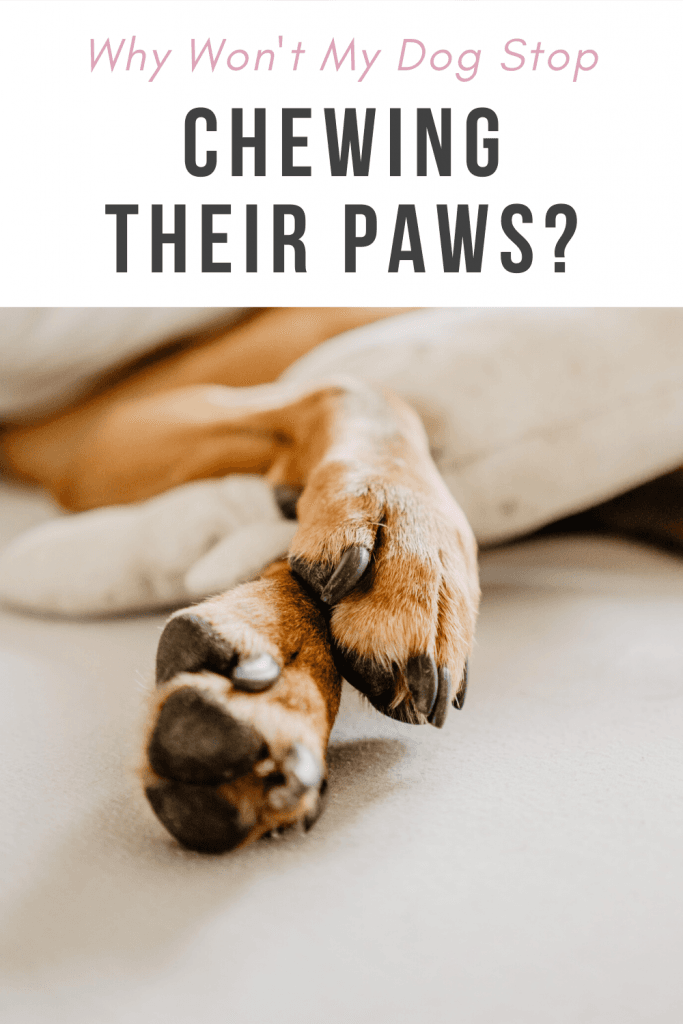Your dog might be licking and chewing their paws more than usual, and you’re unsure why. While it’s a common behavior that can stem from simple exploration or cleaning after a walk, excessive paw licking can signal underlying issues that need attention. Dr. Valentina Henao, a veterinarian and medical director at Veterinary Emergency Group (VEG) in Miami, explains that a variety of causes, from minor irritations to more serious conditions, can lead to this behavior. Understanding these reasons is key to providing your canine companion with the care they need.
Excessive paw licking or chewing, to the point of causing harm, warrants a closer look. It’s important to consult with your veterinarian to pinpoint the exact cause and address it promptly.
Here are some of the most common reasons your dog might be obsessively licking and chewing their paws:
1. Injuries or General Pain
A dog licking or chewing their paws aggressively can be a sign of pain or injury. You might also notice other symptoms such as limping, reluctance to use stairs, or a general decrease in activity. Potential causes of paw pain include:
- Cuts and abrasions: These can occur during walks or play.
- Foreign objects: Thorns, glass, or small stones can become lodged in the paw.
- Insect stings or bites: If you suspect your dog has been stung, check for an embedded stinger, which should be removed to prevent allergic reactions.
- Fractures or sprains: More severe injuries can cause significant pain and discomfort.
If you suspect an injury, it’s crucial to contact your vet for a proper diagnosis and treatment plan.
2. Allergies
Allergies are a frequent culprit behind skin issues, including those affecting a dog’s paws. Dr. Henao notes that allergies can manifest as skin infections, hot spots, and ear infections. Identifying the allergen can be complex, as they can be environmental, seasonal, or related to food.
Environmental and seasonal allergies can be triggered by pollen, dust mites, mold, and other airborne substances. Food allergies or intolerances might arise from certain proteins or ingredients in your dog’s diet.
Veterinary treatment for allergies often involves a multi-faceted approach. This can include allergy medications, injections, topical treatments, and medicated shampoos. If a food allergy is suspected, your vet may recommend a limited ingredient diet or a veterinary diet formulated with novel or hydrolyzed proteins. For flea allergies, a veterinarian-recommended flea and tick preventative is essential. If infections are present due to allergies, your vet might prescribe topical and oral medications and suggest a recovery cone to prevent further irritation.
3. Fleas and Ticks
Fleas and ticks are common parasites that can cause intense itching and discomfort, leading dogs to lick and bite their paws. These pests can infest various areas where dogs spend time, such as bedding, carpets, toys, soil, and tall grasses.
To check for fleas, carefully examine your dog’s skin and fur for small, moving insects or the tell-tale black specks of flea dirt. Ticks often hide in areas like between the toes, under the legs, or behind the ears. If you find a tick, it’s important to remove it carefully with tweezers, grasping it as close to the skin as possible to ensure the entire tick, including its mouthparts, is removed. Leaving parts of the tick embedded can lead to skin infections. A specialized tick removal tool can be very effective.
Preventing and treating flea and tick infestations is straightforward with a vet-recommended flea and tick preventative medication for dogs. Your veterinarian can guide you on the best product for your dog’s specific needs, with options ranging from prescription to over-the-counter medications.
4. Arthritis
Arthritis is a degenerative joint disease that commonly affects older dogs. It can impact not only the larger joints like the hips and legs but also the toes. As the cartilage in the joints breaks down, it leads to pain, inflammation, and difficulty moving the affected paws or limbs.
Several strategies can help manage arthritis and improve your dog’s comfort and mobility:
- Exercise and physical therapy: Gentle, low-impact exercise can help keep the joints moving and reduce pain.
- Medications: Depending on the severity, your vet may prescribe anti-inflammatory and pain-relieving medications to manage discomfort.
5. Behavioral Issues
Sometimes, even after medical causes are ruled out, a dog might continue to lick and chew their paws due to behavioral or mental health issues. Dr. Henao explains that, much like humans, pets can experience anxiety, obsessive-compulsive disorders, or stress that can manifest as excessive grooming behaviors. Boredom can also contribute to such habits. Addressing these issues may require guidance from your veterinarian or a veterinary behaviorist.
Partnering With Your Veterinarian
While paw licking is not typically a medical emergency, you should seek veterinary attention promptly if your dog exhibits any of the following:
- Bleeding from the paws
- Swollen paws
- Limping
- Pus or discharge, indicating infection
- Signs of pain, such as whimpering or wincing when paws are touched
It is essential to work with your veterinarian to determine the underlying cause of excessive paw licking. If left untreated, this behavior can escalate into more significant problems, such as bacterial infections of the paws, a painful condition known as pododermatitis, which can be challenging to treat. Early detection and intervention often lead to simpler and more effective solutions.

